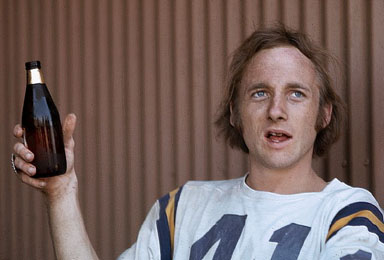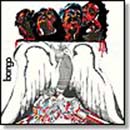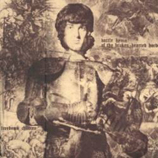
Even
Arab Strap feels like a pick-me-up after being consumed by coverage of Hurricane Katrina for the past week-plus. I can't remember if I purchased Arab Strap's debut,
The Week Never Starts Round Here, direct from Che Mailorder in England, or from Other Music. Either way, I bought it shortly after it came out, as an import on the Chemikal Underground label. (Matador then re-released the album about a year later in 1998.) I bought this disc after being taken by a one-sentence blurb in the mailorder list. How may times have you purchased a record with a similar lack of knowledge and shot yourself in the foot? I know the count is high for me. But this time it worked out.
Arab Strap sounded like nothing else in my record collection at the time. I've heard them described as "post-folk," which doesn't mean much to me. Instead, I'd describe their older music as pub rock for obnoxious barstool philosophers (which also needs some explanation). Their music is the kind of "rock" that a pair of disgruntled dudes would make together after a long night of drinking. Sure, it's "folk-ish," but only in a warped sense. Multi-instrumentalist Malcolm Middleton is essentially a bedroom songwriter. He uses whatever is at hand -- drum machines, acoustic and electric guitar, violin, and organ -- to create the often creepy, somber sounds that encase Aidan Moffett's tales of debauchery, drugs, and regret. But Moffett's off-kilter spoken delivery and blunt tales are really the group's drawing card. If it sounds like he's drunk, pissed, and depressed all at once, it's likely because he is.
But to pigeonhole these guys as a screwy novelty act is to make one huge mistake. After witnessing them live, it's easy to see that there really is a good deal of musicianship and songwriting (as well as effects pedals) to be had if one looks beyond the group's lazy, slobbish appearance. See "Deeper" for example, an awkward tale of young romance set to a
Slint-like sonic landscape. Meanwhile, "I Work in a Saloon" is downright cheery by comparison. Utilizing a simple high-hat driven drum beat and a folky acoustic guitar accompaniment, the song weaves the tale of a bartender working in a room "full of conquests". That sort of cocky, macho character is present in most of Moffett's songs. I've often wondered if there's anyone Moffett hasn't slept with where he lives; if so, she must be the only truly happy person left on Earth.
"Driving" reminds me of classic
Richard Thompson in regards to Middleton's guitar work, and possibly it's Thompson's grasp of a drunkard's vulnerability that truly informs Moffett's writing. Except, instead of one source of grief (
Linda Thompson), Moffett finds inspiration everywhere he looks.
I'm tempted to go with the big "hit" from this record, the
Trainspotting-esque "The First Big Weekend," but I think I'll leave that for you to discover on your own. Instead, here's "The Clearing," a rather unique song for the album, one that seems a bridge to the band's latter work. And, as a bonus, here's a brilliant song from their 1997 Chemikal Underground EP,
The Girls of Summer. Together, these should give you a good idea of where these guys came from.
Arab Strap - "The Clearing"Arab Strap - "Hey! Fever"Visit them on the web. If you have no fucking clue what he was singing about, click
here for help.















